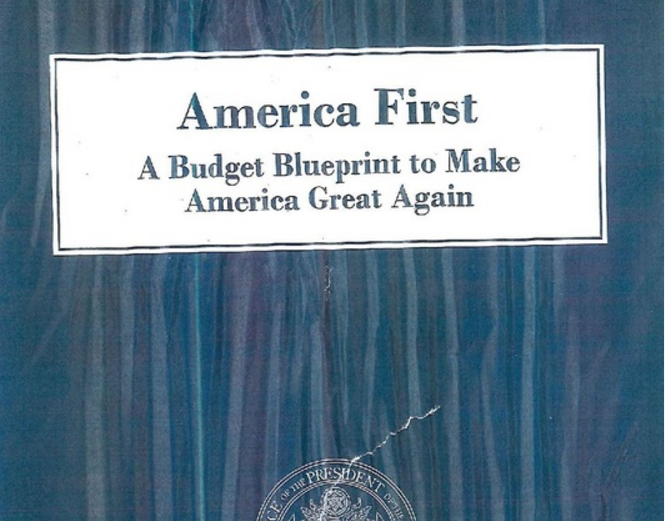
EPA says no impaired status for Lake Erie; Inspector General critical of EPA management
The Trump administration released its final budget this week and there was no backing down from a March draft budget that eliminated $300 million for the Great Lakes.
The $300 million had been a staple of Obama administration budgets and was designated for cleaning up legacy toxic sites and a myriad of other restoration issues.
A recent budget deal to keep the government running until September restored $50 million in immediate cuts for the lakes that the White House wanted. That fueled speculation that Trump might back off from his pursuit of eliminating all funding for the Great Lakes in the face of bi-partisan push back.
It didn’t happen.
Major Savings and Reforms

Mick Mulvaney speaking at an event in Washington, D.C., courtesy of Gage Skidmore
Not referring specifically to the Great Lakes, Trump budget director Mick Mulvaney told a media briefing on Monday that budget cuts in some areas – including the EPA – were part of an effort to have a balanced budget in ten years.
A budget document titled “Major Savings and Reforms” justified the elimination of money for the Great Lakes saying, “These programs perform local ecosystem protection and restoration activities, which are best handled by local and State entities.”
The report noted that the Great Lakes have “received significant federal funding, coordination, and oversight to date. State and local groups are engaged and capable of taking on management of clean-up and restoration of these water bodies.”
The administration’s budget continues a Trump campaign pledge to dramatically reduce the size of the U.S. Environmental Protection Agency. Money for EPA would drop from $8.2 billion to $5.7 billion, a 31 per cent cut.
Reaction to the Trump budget was swift and predictable.
Urging Trump to Reverse Course
Illinois Republican congressman Peter Roskam urged the Trump administration to “reverse course” on budget cuts for the Great Lakes in a letter to EPA administrator Scott Pruitt obtained by Great Lakes Now.
Roskam cited progress to date on restoring the lakes and the economic benefits that restoration funding has provided.

NRDC president Rhea Suh speaking at the Women’s March on Washington, D.C., courtesy of nrdc.org
In a statement, Natural Resources Defense Council president Rhea Suh called the budget a “slash and burn budget that puts polluters first and the rest of us dead last.”
The Trump budget now goes to Capitol Hill where it will be dissected and congress will submit its own budget by the close of the fiscal year in September.
White House budgets are generally seen as a message to congress on the president’s priorities.
It is widely expected that many of the cuts will be restored by congress in the final budget.
Members of congress are receptive to a budget fight for philosophical, regional and political reasons, and to demonstrate they can bring money and services back to their states and districts.
U.S. EPA passes on “impaired” status for Lake Erie
The EPA last week accepted Ohio’s list of impaired waters which doesn’t include the open waters of Lake Erie. The “impaired” designation could have led to tougher regulations on nutrient runoff from farms, the primary cause of the algae blooms.
Lake Erie has been beset by harmful algae blooms including the 2014 bloom that caused the Toledo water crisis which left 400,000 people without safe drinking water for three days.
In approving Ohio’s impaired list, the EPA’s Chris Korleski said in a letter to the Ohio EPA that “EPA recognizes the States’ ongoing effort to control nutrient pollution in the Western Basin of Lake Erie.” He noted that another review will take place in 2018.
Korleski is the Water Division Director in the EPA’s Chicago office.
Inspector General critical of EPA’s management
Coincidentally, the U.S. EPA inspector general released a report last week saying the agency needs to step up its oversight of the states and that previous recommendations still need management attention.
The new report cited the inspector general’s October 2016 report on Flint where EPA’s Chicago office failed to exercise its oversight authority.
Great Lakes Now asked EPA to reconcile the decision to not declare Lake Erie “impaired” with the inspector general’s report that says the agency needs to improve oversight of the states.
EPA spokesperson Enesta Jones reiterated to Great Lakes Now that the agency is “deferring” to Ohio’s decision on the “impaired” issue.
Jones did not comment on the inspector general’s report, saying, “EPA is reviewing the recommendations made by the Office of Inspector General.”
The Trump budget made no mention of closing EPA’s embattled Chicago office as previously rumored.





